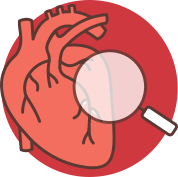Covid and Your Heart
Are there sex and gender differences in how COVID-19 affects women and men?
Looking over reports from all over the world, it appears that the numbers of confirmed cases of COVID-19 are similar in men and women. In nearly every country, however, there are more confirmed deaths from COVID-19 in men. Once men are diagnosed, it appears that they are at higher risk of death.
We don’t know why this is. The virus often enters the body by binding to a protein called ACE2. ACE2 is present in the cells lining the nose, mouth and lungs. Levels of ACE2 are generally higher in men, meaning more cells may be vulnerable to the virus, and this, in turn, may lead to men’s higher risk of severe COVID outcomes and death. Gender issues may also be a factor. Men are more likely to smoke and more likely to drink alcohol, which may be factors in the severity of illness. Men may also seek help in the setting of coronavirus infection later than women, which may also adversely affect outcomes.
Is someone with a heart condition more at risk of getting COVID-19 than somebody who doesn’t have a heart condition?
So far, it appears that anyone can be infected, and we have no data that suggests that one group of people is more or less likely to become infected once exposed.
We do not yet know if with underlying heart conditions might be more likely to show symptoms of the infection or to have a more severe infection than others. So far, most people who get COVID-19 get a mild case, even if they have heart problems. Up to 5% may develop pneumonia or more serious illness.
We do recommend extra caution for those who have been diagnosed with a significant heart condition, including heart failure, reduced heart function, reduced oxygen levels in the blood at baseline, or who have a tendency to develop significant abnormal heart rhythms. Hypertension, diabetes, obesity and advanced age are all risk factors for more serious illness. If you are immuno-suppressed you should also consider yourself at high risk.
Can the coronavirus infect my heart?
 There is no evidence that the virus infects the valves of the heart (endocarditis.) There is also no reason to be concerned that the virus will infect implanted devices such as pacemakers and defibrillators.
There is no evidence that the virus infects the valves of the heart (endocarditis.) There is also no reason to be concerned that the virus will infect implanted devices such as pacemakers and defibrillators.
When individuals become seriously ill with coronavirus, they have an increased likelihood of developing blood clots in arteries and veins. This may lead to heart attacks, strokes and blood clots in the lungs.
There is also data to suggest that in a percentage of cases, COVID-19 infection can lead to inflammation of the heart. So far, we don’t see evidence that the virus attacks the heart muscle cells, but rather that there is inflammation in the tissues surrounding the muscle cells. This is a rapidly developing area, and we are learning more every day.
If I’m having chest pain, what should I do?
When rates of coronavirus infection are high, we all try to avoid elective procedures and any situation that may increase exposure to the virus. At the same time, because people are worried about coming to the hospital during the Pandemic, they are waiting longer before they seek help. We have seen many heart attack patients who have delayed, and by the time they arrive they have suffered significant irreversible heart damage.
Paramedics and hospitals have now developed rapid triage systems that enable the rapid detection of serious heart conditions and separation of suspected COVID-19 patients from other  patients.
patients.
If you have chest discomfort, chest pressure or chest pain, shortness of breath, pain in the jaw, shoulders, arms, upper abdomen or upper back, and if these are accompanied by lightheadness, sweating, or nausea and vomiting, you may be having a heart attack. Call 911 or the local emergency number.
The ambulance and hospital staff will be wearing protective equipment, and they will also provide you with protection to prevent you from being exposed to coronavirus.
If you think you may be having a heart attack, get help in time! When it comes to your heart, minutes matter.
For more FAQs about your heart in the COVID-19 era, see the FAQs of the European Society of Cardiology. Go to:
https://www.escardio.org/Education/COVID-19-and-Cardiology/what-heart-patients-should-know-about-the-coronavirus-covid-19
Search
Recent Posts
Abuse and Heart Disease
Abuse and Heart Disease: Exposure to trauma and...The Fake News Fiasco
We are exposed to a tremendous amount of inform...Coaching For Change
The Pollin Center’s health coaching group is an...When on-line is off limits: Innovative Corona-tailored health promotion program for Ultra-orthodox women – Chevruta L’Chaim
Ultra-Orthodox (Haredi) women have worse health...21444
The stress, apprehension and the fears coupled ...
